Fifth Monarchists
Following the English Civil War groups such as the Fifth Monarchists, Levellers, Anabaptists and Diggers began to demand political reforms. (1) The Fifth Monarchists believed that the death of Charles I in 1649 was a prophetic moment, signalling the coming of the new millennium and the reign of Christ and the saints on earth. This was as a result of their close reading of the prophecies of the Book of Daniel, in which the fall of the four earthly empires (Assyrian, Persian, Greek and Roman) would be followed by the rule of "King Jesus" and his saints. (2)
Clement Walker was a lawyer and a MP, and he feared what had been unleashed during the war. "They have cast all the mysteries and secrets of government... before the vulgar (like pearls before swine), and have taught both the solidarity and people to look so far into them as to ravel back all governments to the first principles of nature... They have made the people thereby so curious and so arrogant that they will never find humility enough to a civil rule." (3)
Oliver Cromwell was opposed to these groups and their leaders such as John Lilburne were imprisoned. Soldiers continued to protest against the government. The most serious rebellion took place in London. Troops commanded by Colonel Edward Whalley were ordered from the capital to Essex. A group of soldiers led by Robert Lockyer, refused to go and barricaded themselves in The Bull Inn near Bishopsgate, a radical meeting place. A large number of troops were sent to the scene and the men were forced to surrender. The commander-in-chief, General Thomas Fairfax, ordered Lockyer to be executed. (4)
Lockyer's funeral on Sunday 29th April, 1649, proved to be a dramatic reminder of the strength of the Leveller organization in London. "Starting from Smithfield in the afternoon, the procession wound slowly through the heart of the City, and then back to Moorfields for the interment in New Churchyard. Led by six trumpeters, about 4000 people reportedly accompanied the corpse. Many wore ribbons - black for mourning and sea-green to publicize their Leveller allegiance. A company of women brought up the rear, testimony to the active female involvement in the Leveller movement. If the reports can be believed there were more mourners for Trooper Lockyer than there had been for the martyred Colonel Thomas Rainsborough the previous autumn." (5)
Oliver Cromwell and Fifth Monarchists
There were senior figures in Cromwell's government that were sympathetic to the Fifth Monarchists. This included Major General Thomas Harrison. According to Edmund Ludlow, a senior officer in the New Model Army, Harrison was a committed Fifth Monarchists and was willing to take up arms to usher in the kingdom of heaven on earth. Harrison used to quote the apocalyptic book of Daniel (7:18) that "the saints… shall take the kingdom", to which he added another to the same effect, "That the kingdom shall not be left to another people"'. (6)
In July, 1653, Oliver Cromwell established the Nominated Assembly and the Parliament of Saints. The total number of nominees was 140 (129 from England, five from Scotland and six from Ireland). Harrison was responsible for nominating four members of his own Fifth Monarchist sect, as well as getting himself elected to the new council of state. (7) The nominated assembly grappled with several of Harrison's favourite issues, including the immediate abolition of tithes. There was general consensus that tithes were objectionable, but no agreement about what mechanism for generating revenue should replace them. (8)
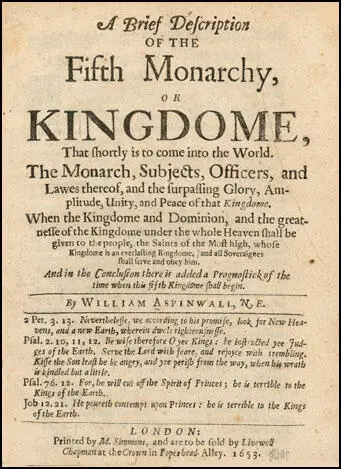
Another leading figure in the Fifth Monarchist movement was John Carew, who represented Devon in the Parliament of Saints. Carew did not object to government by a single person, but soon expressed his hostility to the Cromwellian protectorate and his suspicion regarding its hereditary pretensions in a work called The Grand Catastrophe (January 1654). His opposition to Cromwell was reflected in his rumoured involvement in 1654 in the ‘Wildman' plot with its call to arms against the protector, and in his demand for the release of two Fifth Monarchist preachers, Christopher Feake and John Rogers, in February 1655. (9)
Bernard Capp, the author of The Fifth Monarchy Men (1972) has argued the Fifth Monarchist movement in the 1650s was among cloth workers and other craftsmen. Capp stressed their class consciousness, and their hostility to aristocracy. (10) Christopher Hill has suggested that their programme was in many points similar to that of the Levellers, attacking tithing priests and lawyers as well as the rich. (11)
During this period Christopher Feake emerged as one of the leaders of the movement. He was lecturer at both St Ann Blackfriars and All Hallows-the-Great. In 1652, on the recommendation of Major-General Thomas Harrison, he preached before the House of Commons. In 1654 he was removed from his posts on account of being "obnoxious to the government". It was from these pulpits that his descent into notoriety may be said to have commenced in earnest. (12)
Feake had became one of the movement's recognized leaders and one of the most hostile and outspoken critics of Oliver Cromwell and his government, which he had with some reservation initially supported. In 1653 Feake denounced Cromwell as "the man of sin". (13) Cromwell found these comments unacceptable and both Feake and Vavasour Powell, another Fifth Monarchist was arrested and imprisoned but was released after a few weeks. (14)
In January 1654 Feake was arrested again and imprisoned in Windsor Castle, for "the preservation of the peace of this nation". Feake, however, continued to lead the Fifth Monarchy movement from prison, notably through his pen, and he quickly published fourteen letters he had sent to followers urging the faithful, among other things, to be ready to raise an army "for the King of saints". (15)
John Rogers
John Rogers was another important figure in the movement. In Ohel, or, Beth-shemesh (1653), Rogers articulated millenarian convictions and argued that the execution of Charles I had been partial fulfilment of the prophecy in Daniel 2: 31–44. "In preparation for Christ's return, Rogers called for a drastic purge of the law, deeming it tyrannical and a vehicle for the ruination of godly families. Denouncing lawyers as knaves, he accused them of oppressing others, living in sin, and impeding the work of reformation. No less acceptable were monarchy and nobility; the latter, he opined, was a fancy for fools and children. He called as well for the abolition of mandatory tithing." (16)
Five days after the dissolution of the Rump Parliament, Rogers issued a broadside calling on Oliver Cromwell to personally select godly men to govern the Commonwealth through a parliament or sanhedrin of seventy members, or one per county, and, in the interim, a council of twelve. This appears to have been the first printed proposal for a nominated assembly. (17)
This was followed by another pamphlet where he insisted that lawyers must be eradicated as a profession. Legal proceedings must be in English, justice dispensed without charge, courts decentralized, and every person permitted to plead his or her case before judges (elected in each town) and juries. Like other Fifth Monarchists he believed tithes too must be abolished. (18) Fifth Monarchists also called for all judges to be elected. (19)
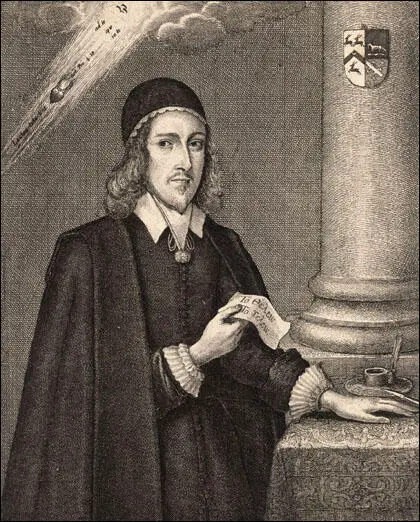
At a meeting in his church on 28 March 1654, John Rogers denounced the apostasy of eminent people, churches, and ministers, protested the persecution of the godly, and called for a spiritual union of saints. John Thurloe, the head of Cromwell's intelligence services, ordered the seizure of his books and papers on 7 April 1654. Rogers responded by sending a letter to Cromwell opposing the rule of government by one person. Having been weaned from monarchy, England must be governed by parliaments elected annually or biennially, but with royalists excluded from the franchise. Rogers also renounced the use of weapons to oppose the protectorate and called for the release of Christopher Feake, and other Fifth Monarchists in prison. He also condemned all censorship and the closure of his meeting-place. (20)
John Rogers had strong opinions on sexual equality. This was partly inspired by his wife's interest in the subject. He forbade men to despise women "or wrong them of their liberty of voting and speaking in common affairs. To women I say, I wish you be not too forward (a reference to his wife) and yet not too backward, but hold fast your liberty... Ye ought not by your silence to betray your liberty." (21)
Vavasour Powell described Oliver Cromwell as a "vile person" and urged his hearers to ask God whether he would "have Oliver Cromwell or Jesus Christ to reign over us?" He was arrested on 21 December, and was released on the twenty-fourth. He made his way back to Wales on 10 January 1654 and began a programme of preaching in mid-Wales which entrenched his opposition to the new government. "His enemies sent ample evidence of his hostility and customary vehemence of language, but noted also the element of respect he commanded among the magistrates of mid-Wales. By March 1654 he had devised a petition against the government, and he and ten sympathizers were summoned before Montgomery great sessions for this activity against the protectorate. There was no prospect of his joining any alliance with royalists, however, for all his dislike of the new regime. In the spring of 1655 he was again in arms against insurgent royalists, accompanied by men of Wrexham: he was wounded in a skirmish." (22)
Fifth Monarchist's Rebellions
By 1655 Thomas Venner was employed as a master cooper in the Tower, but he was arrested in June and dismissed for allegedly discussing the possible assassination of Oliver Cromwell. (23) The government did not take him very seriously, for he was free by winter, when he participated in meetings with other Fifth Monarchists, including John Portman and Arthur Squibb, and republicans such as John Okey and the naval officer John Lawson. It is claimed that the men discussed A Healing Question (1656) that had been written by Henry Vane. The pamphlet argued for civil and religious liberty. (24)
It was the starting point for their discussions about possible joint political action, but they failed to achieve substantive agreement. Okey, Lawson, Portman, and others were arrested in the summer, and officials were searching for Venner. In early August he was holding meetings of his Fifth Monarchist congregation at Swan Alley, Coleman Street, London; copies of Englands Remembrancers, "urging the godly to elect proponents of the Good Old Cause to parliament, were distributed." (25)
In April 1657 he planned a rising that was backed by a manifesto, a flag that depicted a red lion and the motto "Who shall rouse him up?" The rebels intended to rendezvous at Mile End Green and then march into East Anglia, where they expected many recruits to join them. Venner and about 25 other men were arrested in London before "their plans for a theocracy and government according to biblical lore had been put to much of a test." Venner was sent to prison again, without a trial, and by the time Charles II was restored to the throne he was free once more. "His zeal was undimmed, possibly because no one seemed to take him seriously enough to prosecute him for what were undoubtedly treasonous acts." (26)
Restoration
On the Restoration the two leading Fifth Monarchists, Thomas Harrison and John Carew were obvious targets for the Royalists. Harrison and Carew refused to flee the country and was therefore like other Regicides arrested and brought to the Tower of London. At his trial in October 1660 Harrison asserted that he had acted in the name of the parliament of England and by their authority. "Maybe I might be a little mistaken, but I did it all according to the best of my understanding, desiring to make the revealed will of God in his holy scriptures as a guide to me". (27)
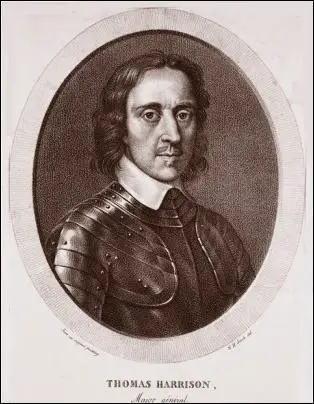
Harrison claimed he had been acting on the authority of the House of Commons: Denzil Holles rejected this argument. "You do very well know that this that you did, this horrid, detestable act which you committed, could never be perfected by you till you had broken the Parliament. That House of Commons, which you say gave you authority, you know what yourself made of it when you pulled out the speaker; therefore do not make the Parliament to be the author of your black crimes." (28)
Harrison was found guilty of treason and was sentenced to be hung, drawn and quartered. On 13th October 1660 he was taken on a sledge to Charing Cross, the place of his execution. On the way to his execution, Harrison said: "I go to suffer upon the account of the most glorious cause that ever was in the world." (29) Harrison said on the scaffold: "Gentleman, by reason of some scoffing, that I do hear, I judge that some do think I am afraid to die... I tell you no, but it is by reason of much blood I have lost in the wars, and many wounds I have received in my body which caused this shaking and weakness in my nerves." (30)
John Carew was also arrested and at his trial denied being "moved by the devil" and professed obedience to God's "holy and righteous laws" and the authority of an act of parliament. Found guilty, he was executed at Charing Cross on 15 October, although his family was granted his body for private burial rather than having to suffer the ignominy of its public display. Carew went to the scaffold confident that his prosecutors would be destroyed by the wrath of God, and by the "resurrection of this cause". He said that his own blood would "warm the blood that had been shed, and cause notable execution to come down upon the head of their enemy" (31)
Thomas Venner Rebellion
Thomas Venner responded to death of Harrison, Carew and the other Regicides by producing a new manifesto, A Door of Hope, that called his followers to arms, urging them not to sheath their swords until the monarchy had been destroyed. It called for an international crusade, financed by expropriated property, to defeat France, Spain, the Catholic states in Germany, and the papacy, and for a godly society free of poverty, taxation, primogeniture, and capital punishment for theft. (32)
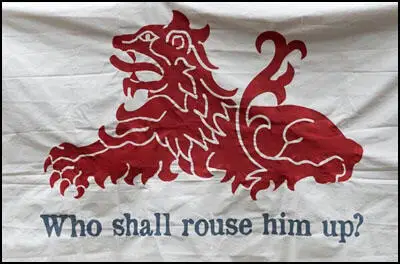
Venner and about 50 of his supporters carried flags emblazoned with King Jesus, and the "regicides' heads upon the gates" temporarily seized St Paul's, before retreating to Aldersgate. The rebels fought in a skirmish early on Wednesday morning near Leadenhall Street. Venner later claimed he had killed at least three of the approximately twenty loyalists who died. The Vennerites suffered comparable losses, and Venner himself sustained nineteen wounds. (33)
Arraigned at the Old Bailey on the 17th, he initially refused to plead, instead launching into a discourse on the Fifth Monarchy. After finally pleading not guilty, he admitted having participated in the insurrection, but not as leader, for that had been Jesus's role. (34) As Venner prepared to be hanged, drawn, and quartered before his meeting-house on 19 January 1661, he remained defiant, claiming to have acted "according to the best light I had, and according to the best understanding that the Scripture will afford". (35)
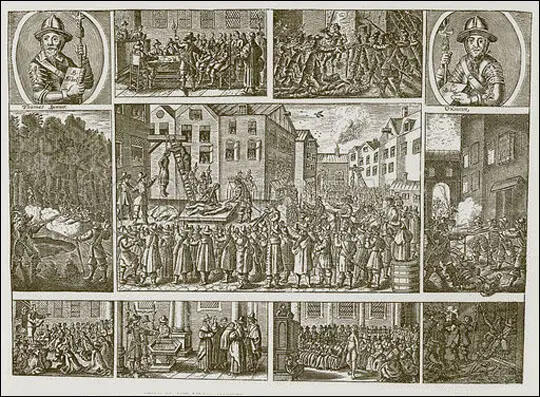
By 21 January thirteen of his compatriots had been executed, and the government demolished his meeting-house. Their heads were stuck up on London Bridge as a warning to others who might attempt similar rebellious acts. (36) As Richard L. Greaves has pointed out: If the revolt was pathetic and desperate, as some historians have suggested, it was also a manifestation of Venner's fierce conviction that Christ's people, their triumph assured, were literally to take the field against the forces of Antichrist. Resolute in his faith, Venner was a misguided millenarian zealot." (37)
Two days after Venner's execution George Fox and eleven other Quakers issued what latter became known as the "Peace Testimony". The signers did not include militants such as Edward Burrough and Thomas Salthouse. The statement said it wanted to remove "the ground of jealously and suspicion" regarding "the harmless and innocent people of God, called Quakers." It then went on to argue: "We utterly deny all outward wars and strife and fightings with outward weapons, for any end, or under any pretence whatsoever; and this is our testimony to the whole world. The spirit of Christ, by which we are guided, is not changeable, so as once to command us from a thing as evil and again to move unto it; and we do certainly know, and so testify to the world, that the spirit of Christ, which leads us into all Truth, will never move us to fight and war against any man with outward weapons, neither for the kingdom of Christ, nor for the kingdoms of this world." (38)
Last Days of Fifth Monarchists
Vavasour Powell was arrested and sent to the Fleet prison and wrote there The Bird in the Cage Chirping (1662) an attack on King Charles II: "We have been stomach-full, sick and surfeited with the sweet and fat things of God's house … we trampled and trod under foot the good pastures". (39) On 30 September 1662 he was moved to Southsea Castle and remained there for five years. The downfall of Edward Hyde, Earl of Clarendon, seems to have provided a reason for freeing long-term prisoners of conscience like Powell, and in November 1667 the preacher at last walked free. Powell refused to stop criticizing the government and in March 1668 he was reported to have preached to a congregation of Fifth Monarchists at Blue Anchor Alley, Old Lane, London. (40)
John Rogers took refuge in the Netherlands where he studied medicine at Leiden University and Utrecht University, graduating MD at the latter in October 1662. The same year the government responded favourably to his petition for permission to return to England, and by the year's end he had settled at Bermondsey where he practised medicine and preached. On 13 June 1664 he was incorporated MD at Oxford. (41)
Other Fifth Monarchists such as Christopher Feake kept a low profile. He is recorded as a teacher at Dorking in 1662. The following year he was arrested in Dorking and taken back to London for questioning, but was released on a good-behaviour bond. In 1672 he was licensed as an Independent. (42)
Primary Sources
(1) Christopher Hill, The World Turned Upside Down: Radical Ideas During the English Revolution (1991)
This is the essential background to bear in mind when we consider later attempts to achieve democratic political objectives - the Diggers by quiet infiltration, by contracting in, by appeal to Oliver Cromwell; the Fifth Monarchists, who expected the direct intervention of King Jesus in English politics to bring about the effects which democratic political methods had failed to achieve; the Seekers and Ranters, less directly political, but deeply concerned, as were the Quakers, with the problem of "sin" and how to escape from its all-pervasiveness. What strikes the historian is how many political objectives all these groups have in common - abolition of tithes and a state church, reform of the law, of the educational system, hostility to class distinctions. They differ profoundly in the means they advocated to achieve these common ends as they thrash around in the confining pool of their society, from which, in the last resort, there is no escape.
(2) Clement Walker, History of Independency (1661) page 140
They have cast all the mysteries and secrets of government... before the vulgar (like pearls before swine), and have taught both the solidarity and people to look so far into them as to ravel back all governments to the first principles of nature... They have made the people thereby so curious and so arrogant that they will never find humility enough to a civil rule.

